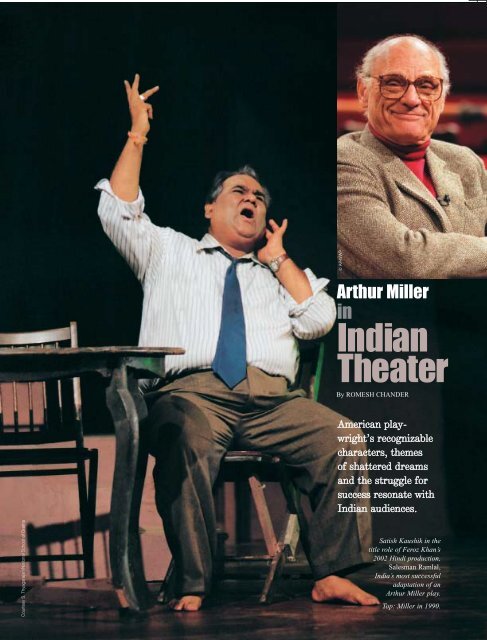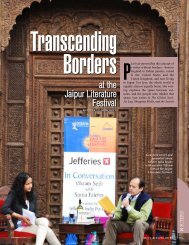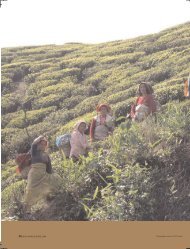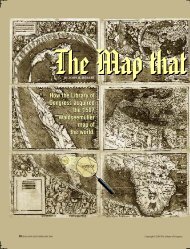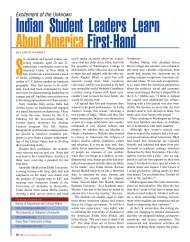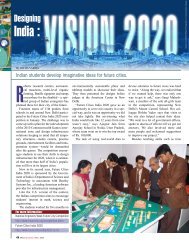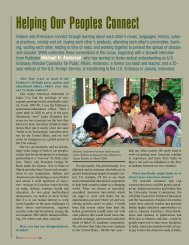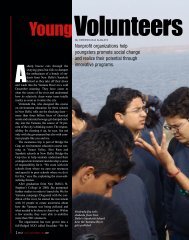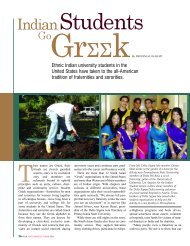Create successful ePaper yourself
Turn your PDF publications into a flip-book with our unique Google optimized e-Paper software.
Courtesy S. Thyagarajan/National School of Drama<br />
© AP-WWP<br />
<strong>Arthur</strong> <strong>Miller</strong><br />
<strong>in</strong><br />
<strong>Indian</strong><br />
<strong>Theater</strong><br />
By ROMESH CHANDER<br />
American playwright’s<br />
recognizable<br />
characters, themes<br />
of shattered dreams<br />
and the struggle for<br />
success resonate with<br />
<strong>Indian</strong> audiences.<br />
Satish Kaushik <strong>in</strong> the<br />
title role of Feroz Khan’s<br />
2002 H<strong>in</strong>di production,<br />
Salesman Ramlal,<br />
India’s most successful<br />
adaptation of an<br />
<strong>Arthur</strong> <strong>Miller</strong> play.<br />
Top: <strong>Miller</strong> <strong>in</strong> 1990.
Keshav Anand<br />
and Shanaz Italia<br />
<strong>in</strong> Ruchika<br />
Theatre Group’s<br />
The Crucible,<br />
directed by Faisal<br />
Alkazi <strong>in</strong> 1987.<br />
56 SPAN MAY/JUNE 2005<br />
The works of American playwright <strong>Arthur</strong><br />
<strong>Miller</strong>, who died this February at 89, are<br />
among the most translated and adapted <strong>in</strong><br />
India, hav<strong>in</strong>g been staged <strong>in</strong> English, H<strong>in</strong>di,<br />
Bengali, Gujarati, Marathi and other languages<br />
with<strong>in</strong> a few years of their appearance<br />
on Broadway or the West End.<br />
<strong>Miller</strong>’s flawed, struggl<strong>in</strong>g characters—most often<br />
placed <strong>in</strong> desperate domestic, economic or social situations—resonate<br />
with the <strong>Indian</strong> middle class. The<br />
characters are very much like people <strong>Indian</strong> theatergoers<br />
recognize with<strong>in</strong> their society or their families.<br />
B.R. Bhargava, visit<strong>in</strong>g professor at the National<br />
School of Drama <strong>in</strong> New Delhi and a freelance theater<br />
critic, suggests that the most important factors for the<br />
unprecedented success of <strong>Miller</strong>’s plays <strong>in</strong> India are<br />
“the thematic content and its structure, conflict<br />
between an <strong>in</strong>dividual and his society, shattered<br />
dreams and failure of expectations culm<strong>in</strong>at<strong>in</strong>g <strong>in</strong>to<br />
the tragedy of a man.”<br />
For half a century, <strong>Miller</strong> served as a social and<br />
moral conscience of the American people, tell<strong>in</strong>g<br />
tales of relationships and lives shipwrecked on the<br />
rocks of false values. For him the theater was not<br />
merely a form of enterta<strong>in</strong>ment. It was a serious<br />
undertak<strong>in</strong>g, which serves “to make man more<br />
human, that is, less alone.”<br />
<strong>Miller</strong>’s first play to be presented on the professional<br />
stage after World War II was All My Sons,<br />
which appeared on Broadway <strong>in</strong> January 1947. It dealt<br />
with the destruction of a middle class family through<br />
the revelation that the father, a war profiteer, had sold<br />
defective mach<strong>in</strong>ery to the U.S. Air Force, an act that<br />
br<strong>in</strong>gs nemeses upon his own progeny. <strong>Indian</strong> audi-<br />
Courtesy Ruchika Theatre Group<br />
ences are familiar with such situations nearer home.<br />
The play was <strong>in</strong> the Henrik Ibsen mold <strong>in</strong> its treatment<br />
of the <strong>in</strong>evitable retribution result<strong>in</strong>g from the gross<br />
violation of basic human values. Ibsen was a 19thcentury<br />
Norwegian playwright admired for his technical<br />
mastery, symbolism and deep psychological<br />
<strong>in</strong>sight. His works, like those of Russia’s Anton<br />
Chekhov on similar themes, are also popular <strong>in</strong> India.<br />
Death of a Salesman, directed by Elia Kazan, with<br />
Paul Muni <strong>in</strong> the lead<strong>in</strong>g role, was presented <strong>in</strong><br />
London <strong>in</strong> July 1949. It deals with the desperate struggle<br />
for survival of an it<strong>in</strong>erant salesman <strong>in</strong> a highly<br />
competitive world. The playwright’s subtle directions<br />
suggest a premonition of disaster, the snuff<strong>in</strong>g out of<br />
salesman Willy Loman’s dream of own<strong>in</strong>g a house,<br />
the cruel absurdity of his suicide, even as the last<br />
<strong>in</strong>stallment on the family home has been paid. <strong>Miller</strong>’s<br />
mastery of characterization, dramatic form, and sense<br />
of human suffer<strong>in</strong>g is revealed quietly, but with a shatter<strong>in</strong>g<br />
emotional <strong>in</strong>tensity.<br />
In the 1950s, The Crucible, set dur<strong>in</strong>g the 17th-century<br />
Salem witch trials mania, was <strong>Miller</strong>’s allegorical<br />
<strong>in</strong>dictment of the communist-hunt<strong>in</strong>g excesses of the<br />
McCarthy era, which had brutalized decent citizens<br />
<strong>in</strong>to betray<strong>in</strong>g their closest friends and professional<br />
associates. <strong>Miller</strong> himself was scrut<strong>in</strong>ized by the<br />
House Un-American Activities Committee and cited<br />
for contempt of the U.S. Congress for refus<strong>in</strong>g to<br />
identify writers he had met at a communist meet<strong>in</strong>g<br />
many years before. In Salem, Massachusetts, from<br />
June through September 1692, 19 men and women<br />
were hanged and a man over 80 was pressed to death<br />
under heavy stones on allegations of witchcraft made<br />
by their neighbors.<br />
<strong>Indian</strong> adapters reta<strong>in</strong>ed<br />
spirit of the text<br />
<strong>Miller</strong>’s structure and his treatment of the theme<br />
have played a big role <strong>in</strong> acceptability of his plays on<br />
the <strong>Indian</strong> stage and much credit goes to the writers<br />
who translated or adapted <strong>Miller</strong> to <strong>Indian</strong> languages.<br />
Their careful work by and large reta<strong>in</strong>ed the structure<br />
and the spirit of the text, widen<strong>in</strong>g <strong>Miller</strong>’s reach here.<br />
“There was someth<strong>in</strong>g premonitory about it, when<br />
Ashim Chakraborty chose to adapt and play <strong>Miller</strong>’s<br />
Death of a Salesman as Janiaker Mritzu <strong>in</strong> Bengali <strong>in</strong><br />
1966,” says Samik Bandyopadhyay, a scholar and critic<br />
of the arts <strong>in</strong> Calcutta. Two years after Jawaharlal<br />
Nehru’s death, he says, “the generation of liberals that<br />
preceded the ‘Midnight’s Children’ had just started<br />
com<strong>in</strong>g out…of their complacent trust <strong>in</strong> the success<br />
of the Nehruvian agenda, and becom<strong>in</strong>g aware of the
A scene from<br />
Act One’s<br />
Hai Wahi Baat Yun<br />
Bhi Aur Yun Bhi,<br />
based on<br />
<strong>Arthur</strong> <strong>Miller</strong>’s<br />
Incident at Vichy.<br />
sneak<strong>in</strong>g entry of yet another agenda of success.”<br />
“Post-<strong>in</strong>dependence Bengali theater has been too<br />
often deprecated for its read<strong>in</strong>ess to grab and adapt<br />
plays from other languages at the cost of develop<strong>in</strong>g<br />
and nurtur<strong>in</strong>g <strong>in</strong>digenous playwrit<strong>in</strong>g,” says<br />
Bandyopadhyay. “But maybe it’s a greater commit-<br />
ment to an ideology of response to the times over a<br />
concern for the future of theater that lies at the core of<br />
this tendency. It was this tendency that drew Bengali<br />
theater to Salesman <strong>in</strong> 1966, and brought it back to the<br />
same play <strong>in</strong> 1993, with the Nandikar Group’s revival<br />
as Feriwallah-r Mrityu, directed by Rudraprasad<br />
Sengupta, <strong>in</strong> a social scenario overcharged with buy<strong>in</strong>g<br />
and sell<strong>in</strong>g—and aggressive salesmanship!”<br />
Bandyopadhyay says, “The family, which has been<br />
<strong>Miller</strong>’s site for his preoccupation with the decay of a<br />
shar<strong>in</strong>g collectivity, has also been the favorite site of<br />
conventional Bengali playwrit<strong>in</strong>g, and quite naturally<br />
<strong>Miller</strong>’s works have been taken up <strong>in</strong> The Price as<br />
Neelam Neelam (1987) by Ashit Mukherjee for the<br />
Gandhar drama group, and A View from the Bridge as<br />
Gotraheen (1996) by Sengupta for Nandikar.”<br />
“Measur<strong>in</strong>g by popular response,” Banyopadhyay<br />
says, “the 1966 Salesman and the 1987 The Price<br />
were runaway successes, runn<strong>in</strong>g for more than two<br />
years at a stretch (perform<strong>in</strong>g two to three times a<br />
month), more maybe for their obvious performance<br />
and act<strong>in</strong>g values than their politics, which also contributed<br />
to the reception.”<br />
Toward the end of the 1960s, he notes, Calcutta’s<br />
lead<strong>in</strong>g H<strong>in</strong>di theater group, Anamika, staged a version<br />
of All My Sons translated as Mere Bachhey. “One<br />
wonders who chose this text that centers on <strong>in</strong>dustry’s<br />
anti-humanity for an audience that was almost exclu-<br />
Courtesy Act One<br />
sively the bus<strong>in</strong>ess community,” he says. “The play, <strong>in</strong><br />
spite of its f<strong>in</strong>e productional values, had to be taken<br />
off the stage after three shows.”<br />
Of <strong>Miller</strong>’s 24 plays, just half a dozen have been<br />
staged <strong>in</strong> <strong>Indian</strong> languages. These are All My Sons<br />
(1947), Death of a Salesman (1949), The Crucible<br />
(1953), A View from the Bridge (1955), Incident at<br />
Vichy (1964) and The Price (1968).<br />
Director Faisal Alkazi says <strong>Miller</strong>’s early plays f<strong>in</strong>d<br />
an <strong>in</strong>stant echo <strong>in</strong> India because they deal with the tension<br />
between family and society as <strong>in</strong> All My Sons,<br />
which was beautifully and rather typically translated<br />
<strong>in</strong>to H<strong>in</strong>di as Sara Sansaar, Apna Parivar.<br />
Easy transition to <strong>Indian</strong><br />
sett<strong>in</strong>g<br />
In A View from the Bridge, the immigrant experiences<br />
of Sicilians <strong>in</strong> America could easily be the<br />
Punjabi immigrant stay<strong>in</strong>g <strong>in</strong> England, with the clash<br />
between values of the mother country and the adopted<br />
country, notes Alkazi. And that’s how Ruchika<br />
Theatre Group adapted it <strong>in</strong> 1982, sett<strong>in</strong>g it <strong>in</strong><br />
London’s Southall district. A few tweaks of phrase,<br />
<strong>Indian</strong> names for the characters and a couple of<br />
Punjabi idioms and endearments, and the play fit<br />
perfectly, appear<strong>in</strong>g simultaneously as tragic immigrant<br />
tale and a universal contemporary myth of the<br />
rootless self.<br />
But of course it is Death of a Salesman that is the<br />
most universal of <strong>Miller</strong>’s plays. The human tale of<br />
the travel<strong>in</strong>g salesman has been played <strong>in</strong> Bengali by<br />
Rudraprasad Sengupta; <strong>in</strong> H<strong>in</strong>di by Satish Kaushik<br />
<strong>in</strong> the Feroz Khan-directed Salesman Ramlal, the<br />
most popular <strong>Indian</strong> adaptation to date; and <strong>in</strong><br />
English by Alyque Padamsee. Bhanu Bharati directed<br />
a memorable production of it many years ago as<br />
Ek Salesman ki Maut <strong>in</strong> J.N. Kaushal’s excellent<br />
adaptation of the play to a sett<strong>in</strong>g <strong>in</strong> New Delhi’s<br />
Karol Bagh area, as did Ebrahim Alkazi <strong>in</strong> his production<br />
of the same adaptation <strong>in</strong> the late 1990s with<br />
his group, Liv<strong>in</strong>g Theatre.<br />
<strong>Miller</strong> captured the dilemma of the middle class<br />
male of today—hold<strong>in</strong>g onto patriarchal values of<br />
another earlier age <strong>in</strong> a world that has changed forever—lead<strong>in</strong>g<br />
lives marooned and isolated, fragile,<br />
tragic. And the fact that all his heroes are middleaged<br />
gives tremendous scope to actors at the prime<br />
of their careers to essay the moody, fractured, contemporary<br />
man. �<br />
About the Author: Romesh Chander is a senior theater<br />
writer and drama critic with The H<strong>in</strong>du.<br />
SPAN MAY/JUNE 2005 57


